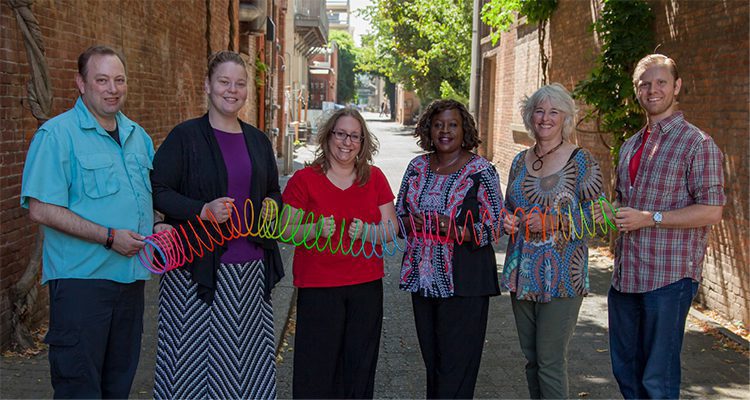“The secret for our success is just flat-out God,” says Erik Denton, a professional clinical counselor and co-founder of Empowering Choices Counseling and Consultation, located in Salem, Oregon.
Erik and his team’s journey to success didn’t happen overnight. It was measured, requiring patience, and bathed in prayer—much like the approach of the services they now offer to so many individuals in the Willamette Valley.
Erik’s idea to start Empowering Choices was born at Corban University, where he and several of his now colleagues and co-founders were completing their master’s degrees in clinical counseling. “We are a clinic that started out as just three Corban University graduate students back in 2014,” fellow co-founder and professional counselor associate, Janda Grigsby remembers.
Since then, empowering choices has been serving the growing needs of communities throughout the Willamette Valley—needs Denton and his colleagues have only seen expanding the past few years. “There’s always been a need for God to fill the void within us,” he says. “Often times we don’t know how to work ourselves out of habitual problems. We don’t know how to untangle ourselves from things we’ve created and the unpredictable tragedies that happen to us.”
While the counseling done at Empowering Choices is not explicitly Christian, no religious images adorn the walls, and the counselors’ Christian faith does not enter sessions unless requested by the client, faith still forms the backbone of what they do. “We don’t always incorporate prayer and other religious features into our sessions,” says fellow Corban grad and clinical supervisor Amber Sirstad, “but that doesn’t mean we aren’t praying. God continues to strengthen each of us and allows us to be the catalyst in individuals receiving their emotional healing.”
The need has never been greater. Rising rates of depression and anxiety, loneliness, and suicide all act as signposts pointing to a world of fracturing relationships in need of healing. To make matters worse, the demand for mental health counseling has become so dire that many practices no longer have openings for people in need. “We have heard constantly that we are some of the only people available that will even call people back,” Denton says. Among the widespread lack of availability, many practices are no longer accepting insurance because the demand is high enough without it, making Empowering Choices’ approach even more rare and necessary.
Rather than following the trend, this practice full of Corban graduates has decided to take the opposite approach. “We are continually assessing the needs of the area that we serve to try and meet the needs of the community,” Grigsby says. “Our goal is to offer services that are not currently being offered in the areas that we serve.” As a result, Empowering Choices often takes on those who have nowhere else to turn, is ever innovative with their approaches, and is also one of few practices in the Willamette Valley that will work with young children in any capacity.
At the heart of this approach is a desire to meet the needs of those around them, just as Christ did. As a result, the practice accepts people of all backgrounds, faiths, creeds, and contexts with open arms and a listening ear. “As we live out who we are as Christians, we follow the example of Jesus who sat with anyone, regardless of their background, and just loved them,” Denton says.
The impact can be profound. “I regularly have clients tell me I am one of few if not the only person they talk to their issues about,” says Lucas Pitman, one of the original three Corban graduates at Empowering Choices. “Mental and emotional health are equally important to physical health. Just like you need a doctor sometimes in addition to diet and exercise, sometimes you need a mental health professional like a counselor in addition to good relationships and habits.”
Denton agrees. “I sometimes look at counseling as a trickier version of brain surgery,” he says. “For one, we don’t get to use anesthesia on our clients. They’re active participants. So, it’s a surgery of two wills, and theirs is the most important. They set the pace and we have to move at their pace if we really want to help them recover. That’s not the philosophy of every counselor out there.”
It’s a philosophy that was emphasized during their shared time in Corban’s Master of Arts in Counseling program. “The fundamentals are important, and I learned those at Corban,” says Pitman. “Like how to be in a room with a person and focus on them and their needs.”
For every counselor at the clinic, the focus continually comes back to the client and putting their needs first. “My time at Corban prepared me to work in the field as a Christian who is a professional counselor,” says Grigsby. “Sometimes that means that the clients that I interact with have belief systems that conflict with my own, but the training that I received in the program helped me to learn how to reconcile this personally and to continue to work with clients in a genuine and ethical manner.”
For Sirstad, it was through Corban that she first cultivated her passion for specializing in suicide prevention and crisis work. “Because of Corban, I was able to work at the Washington County Jail for my internship,” she says. “That was the best 13 months of my life. It provided me a fantastic foundation to crisis work, which led me to doing suicide prevention.”
And just as Corban helped to shape and mold so many of the counselors at Empowering Choices, they are returning the favor and continuing the training of competent, ethical counseling professionals that are Christians. “Corban trained us, we can help further that training,” Denton says.
As a clinical training site, Empowering Choices frequently takes on and trains graduate counseling interns from Corban University, among other schools. “Nobody else is doing some of the key fundamental training pieces that Corban is doing,” Denton observes. “The Corban students come in much more confident and comfortable with what they’re about to do in the counseling room.”
As a result of this intentional partnership, the impact Corban students are able to have in their community, through their direct field of study, has continued to expand and flourish, in turn allowing more clients to seek and secure the healing and recovery they so desperately need. “It’s exhilarating to be able to watch people heal and grow.” Denton says. “When that happens, it’s all God. We get to experience that joy and happiness that is a part of seeing people come in and walk away changed.”
And even in a hurting community, during one of the loneliest periods in the last century, healing is happening. The process can be slow, requiring patience and intentionality, just like the growth of the counseling clinic Denton and his fellow Corban grads planted back in 2014. “Sometimes the reward in a person’s life is a long time coming,” he says. “It takes time for the seeds to grow into a harvest. Unlike the ground outside, sometimes it can be years and years.”
But even through the turmoil and the waiting, the caring counselors at Empowering Choices are patiently reaping a harvest, and Denton is quick to direct the credit back to the one he considers the source of all healing. “All the barriers we have overcome in starting a small business, our success, is because of God,” he says. “And it all started with asking Him what He wants us to do at every step. This isn’t something that any of us alone or together has done. This has been God directing our steps.”


